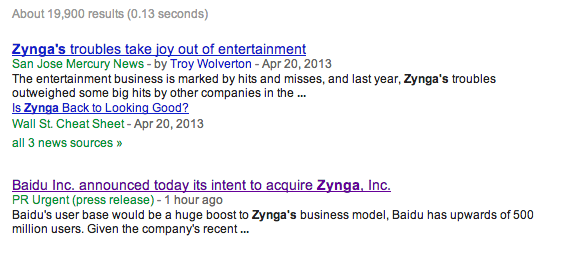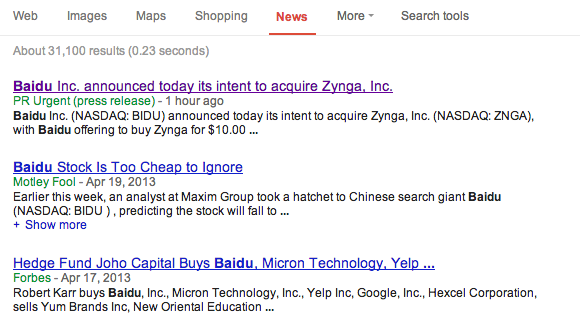Looks like Baidu and Zynga are the most recent victims of a bogus press release stunt. This morning, a company called PR*Urgent put out a press release saying that Baidu — known as the “Google of China” — wanted to acquire Zynga, the social gaming giant. It claimed Baidu offered to pay $10 per Zynga share in cash. But a PR representative for Baidu has categorically denied the news. “Baidu had nothing to do with this news release,” he told TechCrunch.
The release recalls an incident from November last year, when a press release agency called PRWeb distributed false news that Google would be buying WiFi technology company ICOA for $400 million. The news was picked up by a lot of outlets (including TC, I hate to admit), but both companies debunked the news, and PRWeb apologised for the hoax. Like PRWeb, PR*Urgent offers a “free” distribution service.
As with the Google/ICOA incident, it looks like the Baidu/Zynga news may have been put out either as a prank, or an attempt to boost Zynga’s stock price, or lower Baidu’s.
Zynga closed Friday trading at $3.19 per share, and is up 3.45% in pre-market trading. Baidu closed Friday at $86.43 per share. Both Zynga and Baidu will be reporting their quarterly earnings this week, Zynga on April 24, and Baidu on April 25.
The bogus release claims that Baidu’s interest in Zynga was based on its foray into real-money gambling. “The acquisition will enable Baidu to supercharge Zyna’s new ‘real money’ gaming and will enhance competition in mobile and internet gaming,” the fake press release notes. “Baidu’s user base would be a huge boost to Zynga’s business model, Baidu has upwards of 500 million users. Given the company’s recent setbacks, Zynga really needs a win—and if that comes via real people gambling real money, then all the better.”
Back in the real world, Zynga, of course, really is embarking on a real-money gambling business — pursued as Zynga looks for further ways to monetize its gaming platform amid overall growing competition in social and mobile gaming. That strategy finally saw its first launch earlier this month, in the UK. There are further rollouts expected in Europe, Asia and the U.S.
While most rubbish like this isn’t worth reporting, we’re putting this out because at this moment, the release is coming up near/at the top of Google News searches for both companies.


And if you know anything about Baidu’s business — strong on search, but looking to grow that by going big on mobile, increasing moves into gaming and other content, and international growth — there’s just enough of a kernel of truth there to give some pause to people browsing if they don’t bother to look a little deeper.
